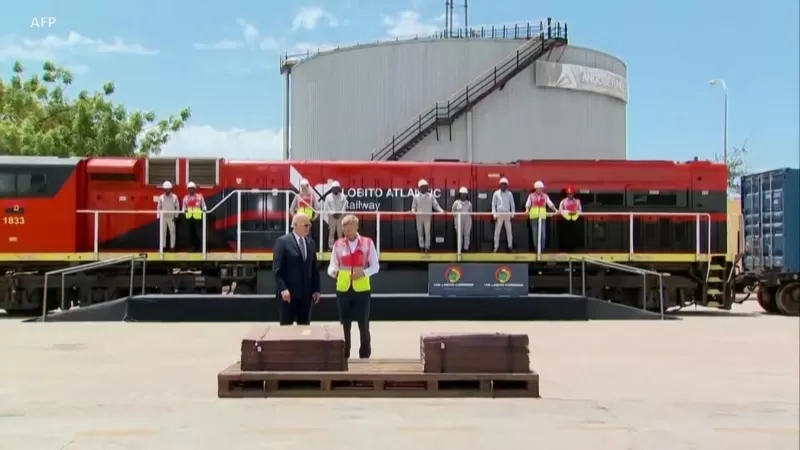LOBITO, ANGOLA — In the scorching heat of midday, U.S. President Joe Biden stood beaming at Angola’s largest port as he shook hands with nine hard-hatted workers. He had traveled all the way from Washington to meet them at the end of an ambitious 1,300-kilometer rail line, financed by the U.S., that brings critical minerals out of Africa’s remote interior.
Despite the lack of activity at the usually bustling port of Lobito, Biden was filled with optimism for Africa’s future. “When I launched this project with our G7 partners last year, I said our goal was to build a better future,” he said. “And folks, the future is here. It’s now. The future is here.”
The U.S. has invested approximately $4 billion to revitalize the dilapidated cross-continental Lobito Corridor track, which runs from copper-rich Zambia, through mineral-rich Congo, and then to the port. Once the full route is completed, which officials say will happen by the end of this decade, the system will reduce a 45-day road journey to a 45-hour rail trip.
During his visit on Wednesday, Biden announced an additional $600 million investment to upgrade the rail, develop the corridor, and expand agriculture. While this project may seem small in comparison to China’s massive Belt and Road Initiative, Biden emphasized that the U.S. seeks true partnership with African nations.
“The United States understands that how we invest in Africa is just as important as how much we invest in Africa,” he stated, flanked by the leaders of Angola, Congo, Zambia, and the vice president of Tanzania, who met with Biden to highlight the project and plan for the future.
Angolan President Joao Lourenco expressed his gratitude for the project, stating that it will be a key factor in the economic development of the region. “This will be a linchpin for economic development that will provide opportunities for small and medium enterprises in the business value chain, particularly in agriculture, industry, and mining. It will increase trade and economic growth in the SADC [Southern Africa Development Community] and Eastern African regions.”
Congolese President Felix Tshisekedi, whose nation is rich in minerals, also praised the project, stating that it is more than just a transportation access. “The corridor is a unique opportunity for regional integration, economic transformation, and improving the living conditions of our citizens.”
Experts note that this project is not just a charitable effort. “From the U.S. and EU point of view, it’s crucial for us to have access to critical minerals for the green economy. Without it, we will fall behind in terms of greening the global economy,” said E.D. Wala Chabala, an independent economic policy and strategy consultant.
An Angolan agricultural official told VOA that the country hopes to use this boost to eventually export higher-value items duty-free to the U.S. through the Africa Growth and Opportunities Act. “We are also focused on promoting internal production and effectively addressing our need for food. This process will allow us to evolve towards opportunities such as AGOA,” said Anderson Jeronimo, head of the Planning Statistics Studies Office of the Ministry of Agriculture.
The visit of President Biden and the announcement of additional investments in the Lobito Corridor project have brought a renewed sense of hope and excitement for the future of Africa. This project not only has the potential to boost economic growth and regional integration, but also to improve the lives of citizens in the participating countries.
Mayra Fernandes contributed to this report.


